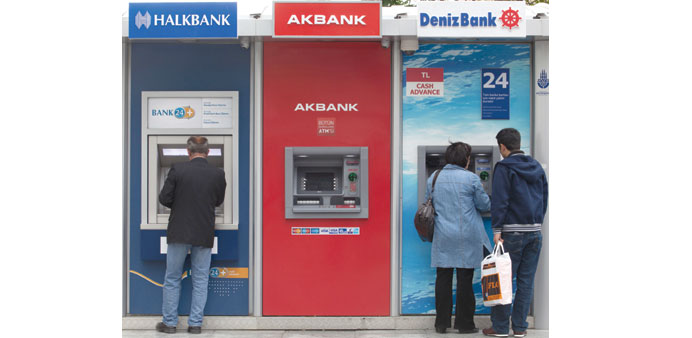Customers use ATMs operated by Turkiye Halk Bankasi, or Halkbank; Akbank and Denizbank in Istanbul. Credit Suisse now has outperform ratings on four Turkish banks - Akbank, Halkbank, Isbank and TSKB.
Bloomberg
Istanbul
Just as Turkish bank profitability drops to the lowest since records began, Credit Suisse says it’s ending a three-year-long bearish view on the country’s lenders.
Valuations near 2009 lows “more than reflect” depressed bank earnings and represent a buying opportunity, says Credit Suisse’s Ates Buldur. The Istanbul-based analyst predicts 2015 will prove to be a trough for the lenders’ earnings, as political uncertainties abate after the November elections and the effects of regulations brought in to stymie credit growth ease going into next year.
“We acknowledge the potential volatility in the short term, but believe Turkish banks should outperform their regional peers and Turkish non-financials in the next 12 months,” Buldur wrote in an e-mailed note Friday. That’s causing Zurich-based Credit Suisse to turn “positive on Turkish banks for the first time in almost three years.”
Credit Suisse now has outperform ratings on four Turkish banks - Akbank, Halkbank, Isbank and TSKB. These stocks, along with Austria’s Erste Group Bank and Budapest-based OTP Bank Nyrt, are now Credit Suisse’s preferred banks in Eastern Europe, the Middle East and Africa, he said. Russian and South African banks are the next-most preferred, while Polish lenders rank lowest.
The call comes as Turkish banks’ return on equity dropped to 10% in August, the lowest since the banking regulator started collecting data 13 years ago. That compares unfavourably with returns on deposits, which central bank data show are about a percentage point higher, meaning it’s presently more lucrative for Turks to park their money in a local bank than to invest in one.

